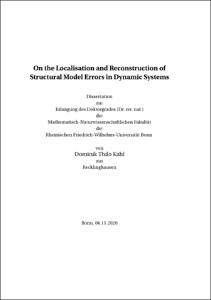Kahl, Dominik Thilo: On the Localisation and Reconstruction of Structural Model Errors in Dynamic Systems. - Bonn, 2021. - Dissertation, Rheinische Friedrich-Wilhelms-Universität Bonn.
Online-Ausgabe in bonndoc: https://nbn-resolving.org/urn:nbn:de:hbz:5-63197
Online-Ausgabe in bonndoc: https://nbn-resolving.org/urn:nbn:de:hbz:5-63197
@phdthesis{handle:20.500.11811/9290,
urn: https://nbn-resolving.org/urn:nbn:de:hbz:5-63197,
author = {{Dominik Thilo Kahl}},
title = {On the Localisation and Reconstruction of Structural Model Errors in Dynamic Systems},
school = {Rheinische Friedrich-Wilhelms-Universität Bonn},
year = 2021,
month = sep,
note = {Pursuing a deeper understanding of the behaviour of dynamic systems is a main task of modern sciences, from accurate weather forecasts to precise drug delivery, from electrical engineering to cell biology and the very fundamental laws of nature. Spurious knowledge or simply the lack of deeper physical insights lead to structural model errors, which cause discrepancies between the predictions from the theoretical model and the experimental data.
Significance of SEEDS Dynamic systems serve as models for systems or processes that evolve over time. To get a better understanding of the dynamic system of interest, a precise mathematical model is crucial inasmuch as erroneous models lead to false conclusions about the current state of the system, about the interactions within the system, and about its future development. In this thesis we offer a methodology for Structural Error Estimation in Dynamic Systems as a solution to this problem. As in the era of big data, classical procedures become infeasible, a theoretical framework is presented for the Model Error Reconstruction Problem: A data-driven approach to compute estimates for structural model errors. By this we quantify the model error, achieve a numerical description, and correct state estimates.
Results We exploit analytical, algebraic, and structural properties of dynamic systems and formulate conditions for the invertibility of a dynamic system. Invertibility guarantees a unique model error reconstruction. We subsequently investigate the network principles that favour the error reconstruction. We unveil the intrinsic gammoid structure of dynamic input-output systems and show that invariable sparsity is a well appropriate regularisation concept for non-invertible systems. In addition a new coherence measure will be introduced that makes a statement about the distinguishability of model error sources and about the redundancy of sensors. Finally, a LASSO-type optimisation technique will be presented as a variety of Dynamic Compressed Sensing. The resulting optimisation problem is capable of producing invariable sparse solutions.},
url = {https://hdl.handle.net/20.500.11811/9290}
}
urn: https://nbn-resolving.org/urn:nbn:de:hbz:5-63197,
author = {{Dominik Thilo Kahl}},
title = {On the Localisation and Reconstruction of Structural Model Errors in Dynamic Systems},
school = {Rheinische Friedrich-Wilhelms-Universität Bonn},
year = 2021,
month = sep,
note = {Pursuing a deeper understanding of the behaviour of dynamic systems is a main task of modern sciences, from accurate weather forecasts to precise drug delivery, from electrical engineering to cell biology and the very fundamental laws of nature. Spurious knowledge or simply the lack of deeper physical insights lead to structural model errors, which cause discrepancies between the predictions from the theoretical model and the experimental data.
Significance of SEEDS Dynamic systems serve as models for systems or processes that evolve over time. To get a better understanding of the dynamic system of interest, a precise mathematical model is crucial inasmuch as erroneous models lead to false conclusions about the current state of the system, about the interactions within the system, and about its future development. In this thesis we offer a methodology for Structural Error Estimation in Dynamic Systems as a solution to this problem. As in the era of big data, classical procedures become infeasible, a theoretical framework is presented for the Model Error Reconstruction Problem: A data-driven approach to compute estimates for structural model errors. By this we quantify the model error, achieve a numerical description, and correct state estimates.
Results We exploit analytical, algebraic, and structural properties of dynamic systems and formulate conditions for the invertibility of a dynamic system. Invertibility guarantees a unique model error reconstruction. We subsequently investigate the network principles that favour the error reconstruction. We unveil the intrinsic gammoid structure of dynamic input-output systems and show that invariable sparsity is a well appropriate regularisation concept for non-invertible systems. In addition a new coherence measure will be introduced that makes a statement about the distinguishability of model error sources and about the redundancy of sensors. Finally, a LASSO-type optimisation technique will be presented as a variety of Dynamic Compressed Sensing. The resulting optimisation problem is capable of producing invariable sparse solutions.},
url = {https://hdl.handle.net/20.500.11811/9290}
}






